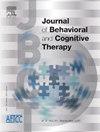A case series in using virtual-reality assisted CBTp for social difficulties in psychosis
IF 1.6
Q3 PSYCHIATRY
引用次数: 0
Abstract
Intro
People with psychosis often experience social difficulties associated with psychological processes, such as fear of harm or negative evaluation from others. Virtual reality presents a unique opportunity to use social environments in therapy. This study presents a case-series of virtual-reality assisted cognitive behavioural therapy (VR-CBTp) for people with first episode psychosis (FEP) who are experiencing social difficulties. It aimed to evaluate the feasibility and acceptability of this novel therapy in real-world clinical settings.
Methods
Eight eligible participants were recruited and received a course of 10 sessions of individual formulation-driven VR-CBTp with a focus on improving social functioning. A novel VR environment and therapy package were piloted for the use of the assessment, formulation and treatment of social difficulties. Psychometric assessments were conducted pre- and post-therapy, and participants provided qualitative feedback about their experiences.
Results
The results provided preliminary information to suggest that the therapy was feasible and acceptable, recruiting to target and with good participant retention. Pre-post comparison of treatment outcomes revealed a reliable change on some of the assessed domains, indicating participants experienced clinical benefits from the therapy.
Conclusion
The inclusion of VR into a course of CBTp for people with psychosis who experience social difficulties was found to be feasible and acceptable with potential therapeutic benefits. A number of challenges to implementation in real-world clinical settings and future directions were identified.
使用虚拟现实辅助CBTp治疗精神病患者社交困难的一系列案例
精神病患者经常经历与心理过程相关的社交困难,例如害怕受到伤害或他人的负面评价。虚拟现实为在治疗中使用社会环境提供了一个独特的机会。本研究提出了一个案例系列的虚拟现实辅助认知行为治疗(VR-CBTp)的人首发精神病(FEP)谁正在经历的社会困难。它旨在评估这种新疗法在现实世界临床环境中的可行性和可接受性。方法招募了8名符合条件的参与者,并接受了10次个人配方驱动的VR-CBTp课程,重点是改善社会功能。一种新的虚拟现实环境和治疗方案进行了试点,用于评估、制定和治疗社会困难。心理测量评估在治疗前和治疗后进行,参与者对他们的经历提供定性反馈。结果初步提示该治疗方法可行,可接受,招募目标明确,参与者保留率高。治疗结果的前后比较显示了一些评估领域的可靠变化,表明参与者从治疗中获得了临床益处。结论将VR纳入有社交困难的精神病患者的CBTp课程是可行的,可接受的,具有潜在的治疗效果。确定了在现实世界临床环境中实施的一些挑战和未来的方向。
本文章由计算机程序翻译,如有差异,请以英文原文为准。
求助全文
约1分钟内获得全文
求助全文
来源期刊

Journal of Behavioral and Cognitive Therapy
Psychology-Clinical Psychology
CiteScore
3.30
自引率
0.00%
发文量
38
审稿时长
60 days
 求助内容:
求助内容: 应助结果提醒方式:
应助结果提醒方式:


